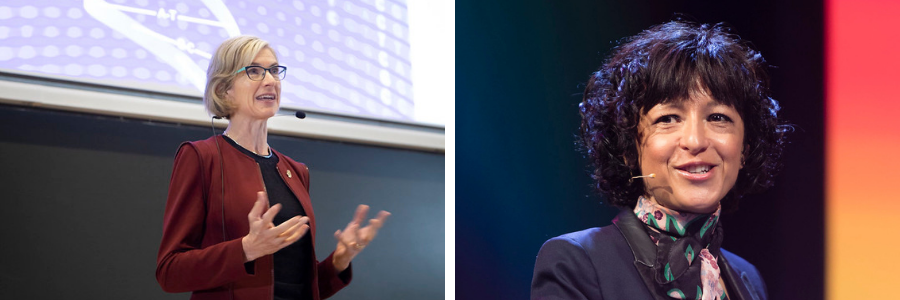Emmanuelle Charpentier and Jennifer Doudna Receive 2020 Nobel Prize in Chemistry
ASGCT Staff - October 12, 2020
Drs. Charpentier and Doudna discovered the genome-editing tool CRISPR-Cas9, which has contributed to many important discoveries, especially in the medical field.

The Royal Swedish Academy of Sciences awarded the 2020 Nobel Prize in Chemistry to Emmanuelle Charpentier, Ph.D., and Jennifer A. Doudna, Ph.D., for their discovery of the genome-editing tool CRISPR-Cas9.
Since the discovery in 2012, these genetic scissors have allowed researchers to change the DNA of animals, plants, and microorganisms with extremely high precision. CRISPR-Cas9 is also contributing to new cancer therapies and may have the power to cure inherited diseases.
Charpentier, director and scientific member at the Max Planck Institute of Infection Biology, Berlin, had been studying the bacteria Streptococcus pyogenes when she discovered a previously unknown molecule, tracrRNA. Her work showed that tracrRNA is part of bacteria’s ancient immune system, CRISPR-Cas, that disarms viruses by cleaving their DNA. After publishing her discovery, Charpentier teamed up with Doudna, a professor of biochemistry, biophysics and structural biology at the University of California-Berkeley. Together, they recreated the bacteria’s genetic scissors in a test tube and simplified the molecular components. Charpentier and Doudna then reprogrammed the genetic scissors. In their natural form, the scissors recognize DNA from viruses, but Charpentier and Doudna proved that they could be controlled so that they can cut any DNA molecule at a predetermined site.
This discovery has shown that, in the future, it may be possible to cure genetic diseases by removing or correcting faulty elements of DNA. While there are no approved gene editing treatments yet, many are currently being researched in clinical trials.
“The discovery of CRISPR-Cas9 has revolutionized science, and we are just now beginning to understand the extraordinary impact the tool can have, not just for patients with genetic diseases, but across the entire spectrum of human disease,” said ASGCT President Stephen J. Russell, M.D., Ph.D. “The fact that we have the ability to correct faulty DNA and potentially cure genetic diseases like sickle cell anemia, or engineer resistance to infection by viruses such as HIV is extremely exciting, and we would not have reached this point without the work of Drs. Charpentier and Doudna.”